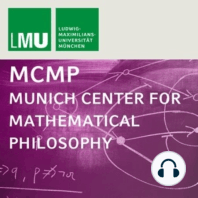67 min listen

Geometrical Roots of Model Theory: Duality and Relative Consistency
Geometrical Roots of Model Theory: Duality and Relative Consistency
ratings:
Length:
69 minutes
Released:
Jul 14, 2015
Format:
Podcast episode
Description
Georg Schiemer (Vienna/MCMP) gives a talk at the MCMP Colloquium (9 July, 2015) titled "Geometrical Roots of Model Theory: Duality and Relative Consistency". Abstract: Axiomatic geometry in Hilbert's Grundlagen der Geometrie (1899) is usually described as model-theoretic in character: theories are understood as theory schemata that implicitly define a number of primitive terms and that can be interpreted in different models. Moreover, starting with Hilbert's work, metatheoretic results concerning the relative consistency of axiom systems and the independence of particular axioms have come into the focus of geometric research. These results are also established in a model-theoretic way, i.e. by the construction of structures with the relevant geometrical properties. The present talk wants to investigate the conceptual roots of this metatheoretic approach in modern axiomatics by looking at an important methodological development in projective geometry between 1810 and 1900. This is the systematic use of the "principle of duality", i.e. the fact that all theorems of projective geometry can be dualized.The aim here will be twofold: First, to assess whether the early contributions to duality (by Gergonne, Poncelet, Chasles, and Pasch among others) can already be described as model-theoretic in character. The discussion of this will be based on a closer examination of two existing justifications of the general principle, namely a transformation-based account and a (proto-)proof-theoretic account based on the axiomatic presentation of projective space. The second aim will be to see in what ways Hilbert's metatheoretic results in Grundlagen, in particular his relative consistency proofs, were influenced by the previous uses of duality in projective geometry.
Released:
Jul 14, 2015
Format:
Podcast episode
Titles in the series (22)
IF epistemic logic and mathematical knowledge: Workshop on Mathematics: Objectivity by Representation by MCMP – Philosophy of Mathematics